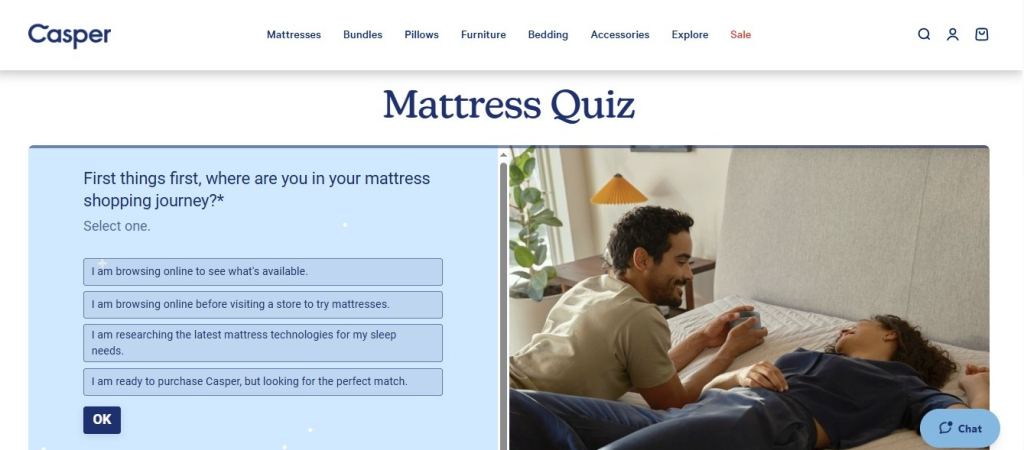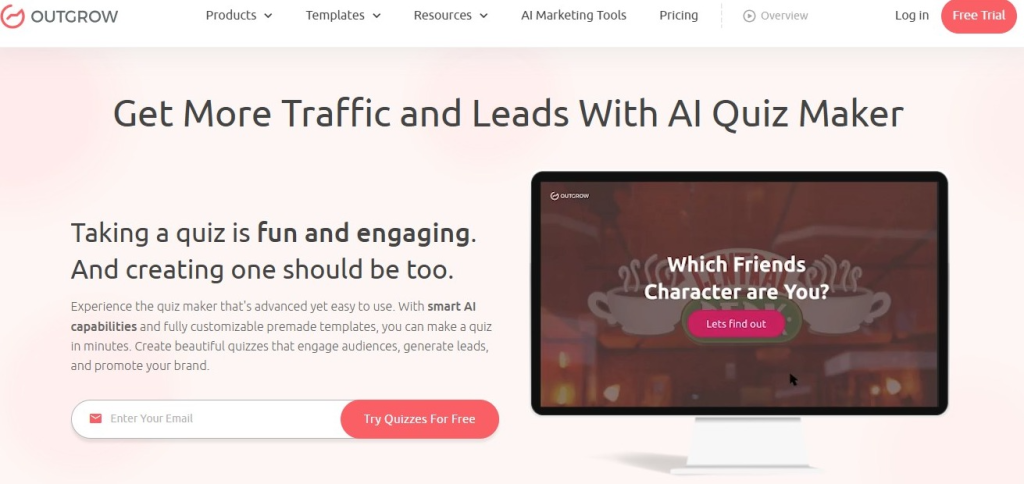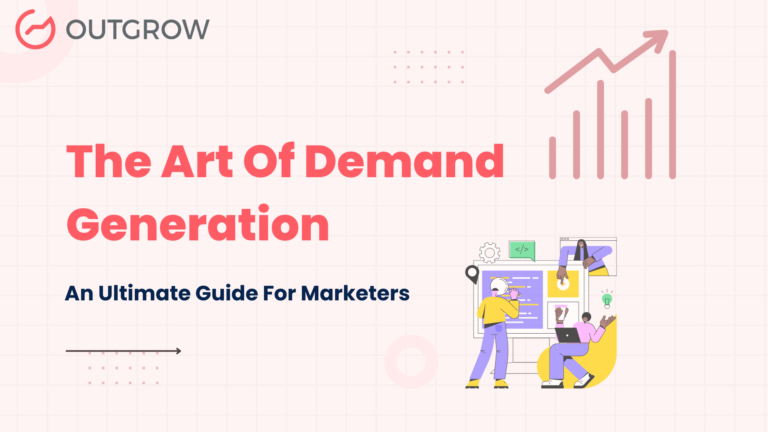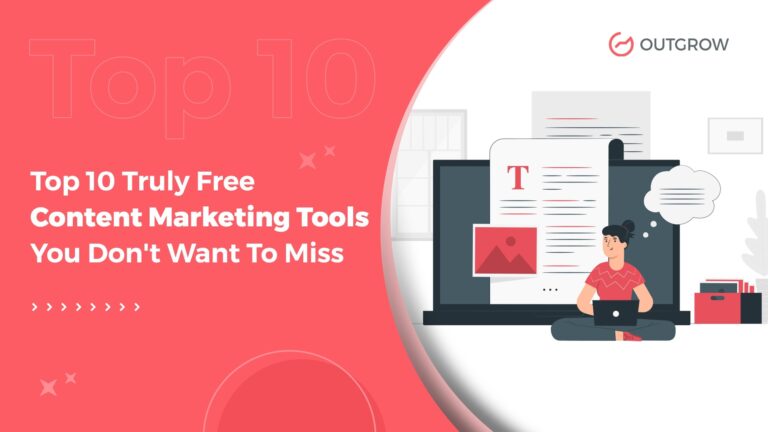Case Study: How Casper Uses Quiz Personalization to Boost E-Commerce Sales by 40%
Table of Contents
My mattress was killing me. Literally. Every morning felt like I’d been wrestling with a brick wall all night. But mattress shopping? Ugh. Who has time for that whole showroom nightmare with sales guys hovering over you?
My friend Sarah saved me. She sent over this Casper quiz thing. Three minutes later, I actually knew what mattress I needed. No confusion, no feeling overwhelmed.
That quiz converts 40% better than their regular pages. Returns dropped 25%. People know what they’re buying now instead of guessing.
Casper’s Quiz Personalization Strategy
A Sleep Quiz That Actually Gets It
Most people don’t understand mattresses. Memory foam? Coil springs? Whatever. We just want better sleep and less back pain.

Casper figured this out. Their Dream Mattress Quiz skips the technical mumbo jumbo. Instead, you get:
- Always waking up hot and sweaty?
- Partner’s tossing keeps you up?
- Sink deep into couches or stay on top?
See what they did there? Real situations, not product specs. The quiz changes based on your answers, too. Say you’re a hot sleeper, and boom – questions about room temperature and pajama preferences. Each path leads somewhere different.
Trust Through Smart Quiz Personalization
Most e-commerce quizzes feel pushy. Like the company just wants to sell you their priciest stuff.

Casper’s approach feels different. After the quiz, they don’t just say “Buy this $1,200 mattress!” They explain the reasoning: “Your answers suggest you sleep hot and move frequently. The Wave Hybrid has cooling layers for temperature regulation plus zoned support to reduce motion transfer.”
Suddenly, buying an expensive mattress online doesn’t seem completely nuts. The quiz personalization creates logical connections between your problems and their solutions. Trust beats guesswork every time.
What Makes Their Method Work
They’re collecting tons of data – over 15 points per customer. But it feels effortless. Progress bars keep you going, skip buttons for personal stuff, works great on phones.

The quiz feels helpful instead of tedious. Like getting advice from someone who knows sleep science. That’s quiz personalization that converts rather than annoys.
Outgrow: The Technology Behind Great Quizzes
Why Brands Pick Outgrow
When you experience smooth quiz personalization like Casper’s, there’s usually solid tech behind it. Outgrow is one quiz maker platform that makes complex stuff look easy.

Key features:
- Adaptive Logic: Questions adjust based on previous responses. No pointless questions about partner disturbance if you sleep alone.
- Seamless Integrations: Quiz data flows straight into your email platform, CRM, and analytics tools. No manual data entry.
- Template Library: Start with proven quiz personalization formats, customize for your products.
- Real Analytics: See where people drop off, which questions confuse them, and what drives conversions.
Building Without Technical Skills
The best part about platforms like Outgrow? No coding required for sophisticated e-commerce quizzes. The interface works like building blocks.
Advanced features:
- Smart scoring for product matching
- Conditional questions based on answers
- Custom result pages with specific recommendations
- A/B testing for quiz personalization optimization
Analytics show what works and what doesn’t. Maybe people quit at question 5. Maybe certain answer patterns rarely convert. This data improves the experience over time.
5 Industry Examples of Quiz Personalization
1. Beauty Gets Personal
Glossier cracked the skincare quiz personalization. Their quizzes explore skin type, lifestyle, and specific concerns to recommend custom routines. Result? Average order values jumped 35% versus regular browsing.
Why does this quiz maker approach work for beauty? Skincare is intensely personal. What clears your friend’s breakouts might destroy your complexion. The quiz cuts through generic advice to find products matching your specific skin.
2. Fashion Subscription Winners
Stitch Fix built its entire business on quiz personalization. Their style quiz covers fit preferences, color choices, budget, and lifestyle needs. Stylists use this data for clothing boxes, hitting 85% customer satisfaction.
The e-commerce quiz works because it captures nuances that product filters miss. Someone might love bold colors but prefer classic cuts. Or want trendy styles for professional settings. Quiz personalization captures contradictions that make personal style unique.
3. Fitness Made Realistic
MyFitnessPal uses interactive quizzes for workout plans and meal recommendations. Their quiz personalization considers dietary restrictions, fitness goals, time constraints, and food preferences to suggest programs people actually follow.
Generic fitness advice fails because everyone’s situation differs. Busy parents need different meal plans than college students. The quiz maker technology matches advice to real circumstances.
4. Home Decor Simplified
Wayfair’s design quiz helps customers navigate their massive catalog without getting overwhelmed. Instead of browsing endless pages, people answer questions about space, style preferences, and budget for curated collections.
Quiz personalization works because home decor involves many variables: room size, existing furniture, personal taste, and budget constraints. Interactive quizzes narrow options to stuff that actually works for your situation.
5. Tech Shopping Humanized
Best Buy’s laptop finder quiz skips confusing specifications, focuses on what people actually do with computers. Gaming, work presentations, video streaming, basic browsing – categories normal humans understand.
Quiz personalization matches usage patterns to appropriate devices. Someone checking email needs different recommendations than video editors. By focusing on behavior over specs, the online quiz maker tool makes technology accessible.
Business Results from Quiz Personalization
Companies using quiz personalization typically see:
- 40-60% higher conversion rates versus standard product pages
- 25-35% reduction in returns through better product-customer matching
- 50% increase in email engagement from quiz-generated leads
- Triple the time spent on site with interactive content
These numbers reflect a simple truth: people want guidance, not more choices. They want purchase confidence, not analysis paralysis. Quiz personalization delivers both.
Implementing Quiz Personalization Successfully
Write Conversationally
Best ecommerce quizzes sound like conversations, not corporate surveys. Use words your customers actually say. Ask about situations they recognize. Skip jargon, speak human.
Solve Problems, Not Push Products
Instead of asking about features, ask about frustrations. Don’t say “What firmness level preference?” Say “Wake up with back pain?” People know their pain points better than product specifications.
Provide Value Beyond Sales
Your quiz personalization should teach something useful, even if people don’t buy immediately. Share tips, insights, and product recommendations based on answers. This builds goodwill, keeps your brand memorable.
Test and Optimize Constantly
Use your quiz maker platform’s data to spot problems and opportunities. Maybe certain questions confuse people. Maybe specific answer combinations rarely convert. Regular optimization dramatically improves quiz personalization results.
Final Thoughts
Casper proved that quiz personalization can revolutionize online shopping. Instead of bombarding customers with product features, they created helpful guidance that felt personal, not pushy.
The numbers speak for themselves: improved conversions, reduced returns, and more satisfied customers. But the ultimate triumph runs deeper. Casper revolutionized customer expectations. Individuals now anticipate customized shopping experiences. They want brands that know their individual requirements, offering relevant solutions.
Other businesses can do likewise with the right strategy and technology. Sites such as Outgrow make advanced interactive quizzes available to businesses that don’t have enormous technical budgets. The problem isn’t creating the quiz – it’s knowing customers well enough to ask the right questions.
Quiz personalization succeeds because it honors the complexity of buying decisions. It understands purchases are personal, emotional, and usually confusing. When you give truthful advice rather than standardized sales speeches, customers reward you with loyalty and trust.
The old way – hurl stuff at people, pray that something catches – is on the way out. Quiz personalization is the way of the future: useful, custom, customer-centric shopping experiences for all concerned.
Frequently Asked Questions
Keep it at 5-10 questions max. Casper’s quiz is 3 minutes, perfect. Longer and people drop it. Shorter, and you don’t gather enough data for effective quiz personalization.
Most quiz maker platforms like Outgrow connect directly with Shopify, WooCommerce, and other major systems. Quiz personalization data automatically flows into your customer database and email marketing tools.
Monitor completion rates, conversion rates of quiz traffic, average order value, and customer lifetime value. Compare these with your other marketing channels to see the real effect of quiz personalization.
Absolutely. Most quiz creator tools have inexpensive plans that are ideal for smaller businesses. Keep it simple, find out what works for your audience, then scale. You don’t have to have Casper’s budget to achieve amazing results.
Products with multiple options or variables benefit most from ecommerce quizzes. Mattresses, skincare, clothing, supplements, home decor – anything where personal preference significantly impacts satisfaction. If customers regularly ask, “Which one is right for me?” you need a quiz.

Muskan is a Marketing Analyst at Outgrow. She is working on multiple areas of marketing. On her days off though, she loves exploring new cafes, drinking coffee, and catching up with friends.




